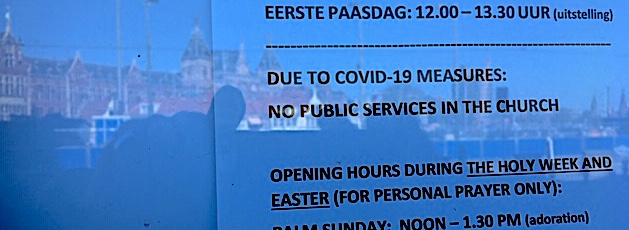
A Holy Week Warning
Yesterday was a different sort of Palm Sunday with church doors closed all over the world. No children paraded into church with palm branches, for example, despite creative efforts no doubt made to celebrate online.
With more time than usual to reflect, let’s consider an often-overlooked aspect of Holy Week which offers a timely lesson for us in Europe and elsewhere today.
As the crowds cheered Jesus into Jerusalem, he was probably not thinking about what was about to happen to himself, according to Matthew’s description in chapter 21. Only five chapters later does Jesus make any mention of his impending death, two days before the Passover.
Look at his actions and his parables in chapters 21 & 22: the cleansing of the temple, the cursing of the fig-tree, the parable of the two sons, the parable of the vineyard tenants, followed by the parable of the wedding feast. None of these focus on his forthcoming death. Read the seven woes spoken in chapter 23 over the pharisees whom he calls serpents and brood of vipers. And the dire warning of the house becoming desolate: Jerusalem and the temple will be destroyed, Jesus clarifies in chapter 24 to his incredulous disciples.
So far, he has made only one veiled reference to his forthcoming death – the story of the vineyard tenants who killed the son of the owner. Instead he talks of his longing to gather the children of Jerusalem, but they were not willing. Although prior to his arrival in Jerusalem he has on three occasions (16:21, 17:22, 20:17) already talked to the disciples about his approaching suffering and death, no specific mention of it is made again until just hours before his arrest.
Connecting thread
So what does preoccupy his thoughts? What is the connecting thread through these stories and actions? Surely it is the fate of Israel and of the Jews who had not recognised the day of their visitation. Consider:
• The cleansing of the temple – a house of prayer for all peoples turned into a commercial market-place – represented judgement on a people who had forgotten why they had been chosen: to be a light to the Gentiles.
• The fig tree was cursed for being fruitless. What fruit should Israel have borne?
• Who was the younger son who agreed to do the father’s will, but didn’t – the Jews? and the older son who initially refused but ended up obeying – the Gentiles?
• The wedding feast tells of the invited guests (Jews) who were too busy to come; the outcasts (read Gentiles) were then invited in.
The key passage seems to be the story of the wicked tenants (21:33-46), who kill the owner’s messengers and then his own son, expecting to inherit the property themselves. Jesus asks the crowd to judge: “What will the owner do to those tenants?” They all know the right answer: “He will bring those wretches to a wretched end and lease the vineyard to other tenants who will give the owner his produce.”
“Exactly!” Jesus in effect replies. He then adds: “(Therefore) the Kingdom of God will be taken from you and given to a people who will produce its fruit.”
Saddest verse
Think about it. Surely that has to be one of the saddest verses in the New Testament! While Paul does give us hope concerning Israel and the Jews in Romans chapters 9 to 11, Jesus actually doesn’t. (Except perhaps for the hint of hope in the last verse of chapter 23: I tell you, you will not see me again until that time when you will say, ‘Welcome! God bless the one who comes in the name of the Lord.’)
Remarkably, Jesus is not here preoccupied with his encroaching personal suffering. Rather he is focused on the missed opportunity for his own people and the tragic consequences.
So what does this have to do with us in Europe today?
The current tide of nationalism can tempt us to repeat Israel’s tragic failure: ethno-centricity. Instead of embracing God’s purposes for all peoples, Israel focused on being the Chosen. They forgot what they had been chosen for: to bless all the peoples of the world, and be a light to the peoples. Too often they adopted an ‘Israel first’ policy.
In chapter 24, Jesus describes the Great Commission in terms of the good news of God’s reign being shared among all peoples of the world. Even the disciples didn’t grasp this at first. When Jesus appeared to them after the Resurrection, they asked in effect, ‘Lord, is this the time when you will make Israel great?’ (Acts 1:6).
Here is a warning for us all when we are tempted to embrace religious nationalism and keep our distance from strangers ‘to preserve our Christian heritage’. The gospel is inclusive, intended for all peoples. We are better people when we commit to the welfare of others, that is to ‘loving our neighbours’. Especially in this time of global crisis, we need to seek the common good.
May Holy Week remind us that the future of the church is multi-cultural, embracing every nation, tribe, people and language.
Jeff Fountain
Director Schuman Centre

This Post Has 0 Comments